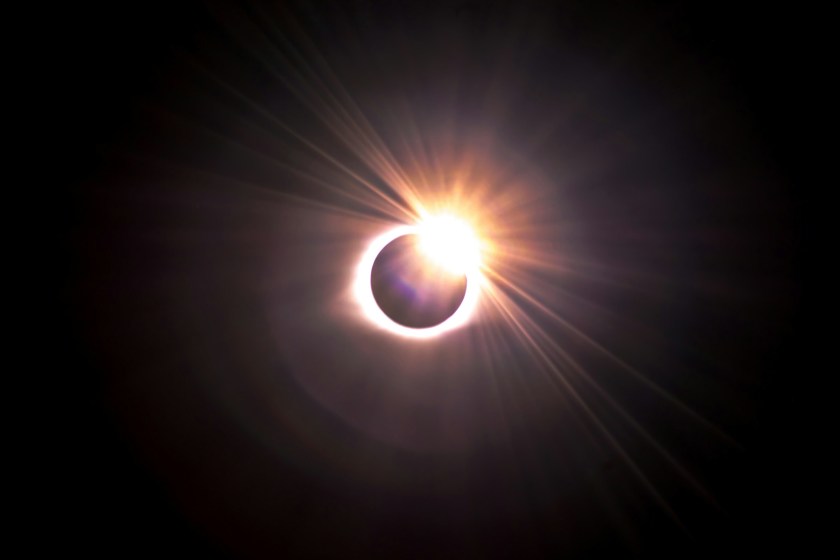Buy One, Get One 50% OFF Eyeglasses
* Restrictions apply. Ask a Team Member for details.

The Safest Ways to Enjoy the 2024 Solar Eclipse
Written by Dr. Elaine Ramos, OD, Nationwide Vision
We're excited for a stunning natural event – the Solar Eclipse on April 8th, 2024. During this time, the Moon will pass in front of the Sun, momentarily hiding it. While a full eclipse, or totality, will be visible in select areas of the United States, everyone will witness the Moon partially obscuring the Sun.
But before you look up, it's important to know how to watch the eclipse safely. There are specific safety measures to consider and risks to avoid. Dr. Elaine Ramos, O.D., an experienced optometrist with EyeCare Partners, offers her expertise on the right way to view the solar eclipse; before taking part in this exciting celestial event, you need to make absolutely sure that you are using the appropriate equipment to keep your eyes safe. Not taking the proper steps could put your eyes at risk for permanent damage.
The Dangers of Viewing a Solar Eclipse
Under normal circumstances, the Sun's brilliance is far too intense for direct observation, even when wearing polarized sunglasses. Briefly gazing at the sun can cause serious eye damage, resulting in a condition known as solar retinopathy. When you stare at the Sun, you are placing the center of your vision, the fovea, directly into the light’s path. The Sun’s intense light then causes damage to the fovea and surrounding retinal cells, causing blurry vision or even loss of central vision.
During a solar eclipse, despite the Moon casting a shadow and partially obscuring the Sun, the sunlight that does get through, especially during totality, remains incredibly bright. This intense light can cause conditions like solar retinopathy. Another name for solar retinopathy is actually eclipse retinopathy because of how dangerous this event is on the eyes. So even if it seems like the light isn’t as bright, the light that still makes it to your eyes is just as intense as any other day. This is why staring directly at the solar eclipse without any protection is going to place your eyes at a significant risk for damage.
To find out how much of the Sun will be obscured where you are, you can use tools like the Eclipse Cities tracker.
How to Safely Enjoy the 2024 Solar Eclipse
Experiencing a solar eclipse is extraordinary, but it's vital to protect your eyes while doing so. Fortunately, there are several safe methods to observe the eclipse without endangering your vision.
Eclipse Viewing Glasses
For those eager to witness the solar eclipse firsthand, investing in a pair of certified solar eclipse glasses is crucial. These glasses aren't your typical sunglasses; they're designed to filter out over 99.999% of sunlight, allowing you to safely gaze at the Sun. Ensure that any glasses you purchase meet the ISO 12312-2 standard, which guarantees they're safe for direct solar viewing. The American Astronomical Society offers a comprehensive list of vetted suppliers where you can find these essential viewing tools.
Joining Observatory Events
Many observatories take advantage of the solar eclipse to hold educational events, providing a perfect opportunity for a safe and informative viewing experience. If there's an observatory nearby, check out their eclipse day plans. They might offer eclipse glasses or set up live feeds of the eclipse on large screens. Participating in these events can enhance your eclipse experience, regardless of your location relative to the path of totality.
DIY Solar Viewing Box
If you're unable to get eclipse glasses or attend an observatory event, creating a DIY Sun Viewer can be a fun and educational alternative. Despite its name, remember that you shouldn't use this to look directly at the Sun. Instead, this device projects an image of the Sun onto a surface inside the box, allowing you to safely observe the eclipse's progress. The principle is like a pinhole projector, with the box size affecting the image size. This simple project can be a great way to enjoy the eclipse from the comfort of your home.
Safely Enjoy this Rare Astronomical Event
With the countdown to this remarkable event underway, it’s essential to prioritize safety for an enjoyable viewing experience. Since the United States won’t see another solar eclipse for two decades, protecting your vision becomes even more critical! To fully appreciate this year’s astronomical wonder without risking your eye health, ensure you have the right protective gear ready. With the right preparation, you can enjoy the eclipse without an unexpected trip to the optometrist.

About the Author: Dr. Elaine Ramos, OD
Dr. Elaine Ramos, OD, received her Bachelors of Science degree from California State University, Fullerton and earned her Doctorate of Optometry from Marshall B. Ketchum University. She completed a residency in vision therapy and neuro-rehabilitation from the State University of New York College of Optometry.
Prior to joining Nationwide Vision, Dr. Ramos was an assistant professor at Western University College of Optometry in Pomona, CA and adjunct professor at Midwestern University in Glendale, AZ where she practiced in the pediatrics and vision therapy clinics. She currently resides in Peoria, AZ with her husband, baby girl, and corgi named Butters.